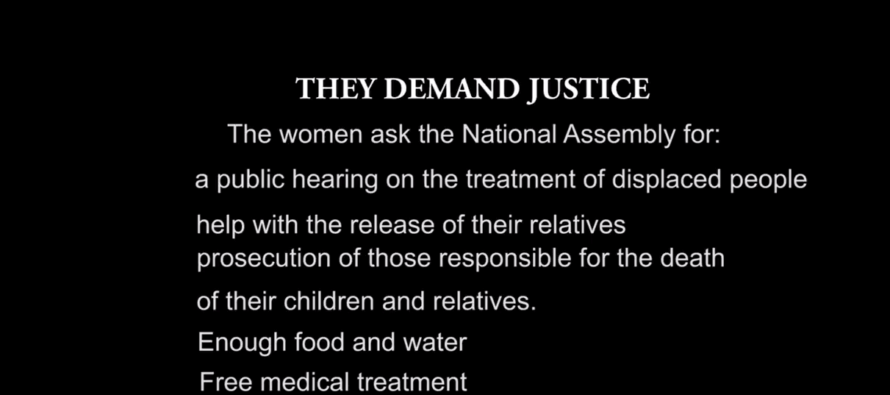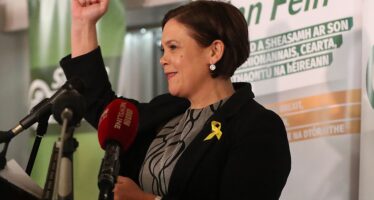International Women’s Day, March 8, Nigerian Women Fight Back

![]()
International Women’s Day is now celebrated annually on March 8. And on March 8 each year, there is certainly no shortage of outrages that have been perpetrated against women over the course of another year of violence, human rights abuses and oppression.
There are also many examples of women fighting back. Not least the women of the Kurdish YPJ/Women’s Protection Units currently witnessing the success of their long and costly fight against the Islamic State.
On the week of this International Women’s Day, Amnesty International (AI) has called for support for thousands of women in North East Nigeria, who are still trapped between the violence of Boko Haram and similar, if not worse, abuse from their so-called protectors – the Nigerian military.
These women are now organizing under the umbrella of ‘The Knifar Movement’.
Boko Haram
Boko Haram first emerged in Maiduguri (North East Nigeria) in 2003; the group was “oppositional” but largely peaceful, under the leadership of the radical Salafist cleric, Mohamed Yusuf. This was not to last long. Since 2009 Boko Haram or The Islamic State in West Africa has been led by Abubakar Shekau and following the Nigerian government’s establishment of a state of emergency at the beginning of 2012, “extended in the following year to cover the entire northeast of Nigeria,” has resulted in an ongoing increase in both security force abuses and militant attacks on the local population.
Over 2.3 million people have been displaced by the conflict since May 2013. Since Boko Haram started its insurgency in 2009 to create their Islamic state in the region, the conflict has not only displaced more than two million people, but it has also killed between 20,000 and 30,000.
7.7 million people in the worst-affected northeastern states of Borno, Adamawa and Yobe, also are in need of humanitarian assistance, according to the UN.
“According to a 2016 report by the United Nations, the Boko Haram insurgency has resulted into severe population displacement, disruption in livelihoods and acute food insecurity in Nigeria. The North eastern states of Adamawa, Borno and Yobe have been the worst hit areas, with the areas witnessing several thousand deaths and millions of residents forced to abandon their homes in search of a safe haven; most of the IDPs take shelter in official camps, unofficial camps and host communities.” (Noipolls)
The Nigerian Military
Since the campaign has escalated into almost outright war local people have been caught between the Islamic movement and the government forces.
“Life under Boko Haram’s control was, says Fatima, ‘hard and full of restrictions’ on movement. Women were not allowed to leave their homes – not even to get food, fetch water, go to the farm or market and to earn their livelihood. Farming and trading crumbled.”
When the military arrived, it turned out life was not to be any better. In late 2015, the military started establishing informal settlements known as satellite camps to host displaced people.
That same year (2015) an Amnesty report counted 20,000 people who were “arbitrarily arrested” by the Nigerian military mostly on suspicion of being a Boko Haram member, according to the 2015 report by the organisation.
Another example of the military’s abuse of its power was reported on by Amnesty International just a year later: Giwa Barracks, a detention facility established in Maiduguri, gained notoriety following the Nigerian military’s imprisonment of thousands of local people accused of being Boko Haram members. Most of them were rounded up during the military’s counterinsurgency operations. Amnesty International called the military detention ”a place of death” in its May 2016 report which found that 149 out of about 1,200 people believed to be held at Giwa at that time, had died, including 11 children under the age of five and babies as young as five months old.
Hazel Healy (writing in the New International last Autumn):
“In 2011, the army’s indiscriminate response to an uprising of the Islamist militant group Boko Haram in Maiduguri, the provincial capital of Borno state, was such that the influential local elders begged the President to withdraw the troops altogether. If this is how the army is going to behave, they said, please take them away. They are killing more people than Boko Haram. We can handle this ourselves.
It’s a familiar story across Africa and the world at large: military responses to violent extremism routinely make things worse. Nine years since Boko Haram rose up against the state, over 30,000 people have died, 2.4 million are displaced and 5 million are dependent on food aid. The insurgency’s eye-watering brutality – against women in particular – has made it a household name. But deploying violent force against Boko Haram has only made things worse.”
Amnesty International
In May 2018 Amnesty’s report, “They Betrayed Us,” claims that women and girls were not only raped by Nigerian soldiers but also starved and forced to trade food in exchange for sex.
“Since early 2015, the Nigerian military has recaptured vast swathes of territory that had come under the control of Boko Haram in the north-east of the country. However, instead of “freeing” hundreds of thousands of people who had been trapped in these areas, the military has carried out systematic patterns of violence and abuse against this population, including war crimes and possible crimes against humanity. This report examines what happened to the group of people who fled or were forced from rural towns and villages that had been controlled by Boko Haram, as the military intensified its operations.” (Amnesty Report)
Amnesty International has continued to draw attention to the military’s abuses in the region and is calling for support for the women of north east Nigeria in their struggle to secure justice from the Nigerian regime and protection form its armed wing, the Nigerian military.
The Knifar Movement
“The Knifar Movement, a group of displaced women in the North-east Nigeria, representing more than 1200 men, women and children in military-run detention centres…”
The group grew out of the many civilians in North-East Nigeria, who had spent years under the control of Boko Haram only to face more violence and abuse when the Islamist group were replaced by the Nigerian military.
After the military regained control of the area many of the survivors of Boko Haram fled or were sent to displaced persons camps. “In these camps women have been subjected to sexual violence and rape – often through demands for sex in exchange for food. Thousands have died for lack of food, water or healthcare.”
Because men of ‘fighting age’ are often suspected of being from Boko Haram, thousands have been taken away by the military. This has caused families to be pulled apart, leaving women isolated and caring for families alone, and exacerbating the risk of abuse, hunger and even starvation.
In May 2018, The International Observatory on Human Rights stated:
“According to the testimonies, Nigerian troops separate women from their husbands in order to sexually abuse them. The women claim that they were raped if they refused to have sex with soldiers in exchange for food. Other women claimed they were cornered and abused while walking alone to collect water. The report also details indiscriminate killings carried out by the Nigerian military once they moved into newly surrendered areas previously occupied by Boko Haram.
Amnesty International emphasises the absence of humanitarian actors, which makes it easier for members of the Nigerian Army and Civilian JTF to commit such crimes.”
In August 2017, Nigeria’s vice president Professor Yemi Osinbajo, then acting president, created the Presidential Investigation Panel to review the military’s compliance with its human rights obligations. The panel submitted its report to President Muhammadu Buhari in February 2018. Its findings are yet to be made public.
In 2017 the Knifar group were also excluded from appearing before and giving testimony to the Presidential Investigative Panel on Human Rights Abuses in the Military.
“The Knifar Movement, a group of displaced women in the North-east Nigeria, representing more than 1200 men, women and children in military-run detention centres, has accused the Presidential Investigative Panel on Human Rights Abuses in the Military of denying it the opportunity to appear before it.”
To this end, the rights group has launched an online “Support the Knifar Movement and demand justice and freedom from abuse”, adding that about 2,000 women have collected lists of names of people from their villages who have experienced abuse by the military.
The women also demanded that:
“…the government to release all detainees held by the military who had not been charged with any criminal offence as well as release the list of all the people in military detention so that their relatives could locate them.
“We also ask the government to bring to justice those soldiers and CJTF responsible for the death of our children and elderly and for raping us, as well as the Boko Haram fighters who are responsible for killing and raping our people,” the group said.
Since then the women continue to campaign:
“For years, we lived in silence, despair and frustration because our husbands, relatives and children are locked up by the military without reason. We have also lost our children in a military-run IDP camp in Bama due to malnutrition and diseases. Some of us were raped by soldiers and Civilian JTF…” the group said.
The Nigerian Military’s response…
…was, of course, one denying the claims.
In one response to Amnesty’s accusations that some experts have said amount to war crimes, the Nigerian military commented:
“These false reports, which are capable of derailing the good work being done by our patriotic and selfless soldiers, must stop.”
Nigerian army spokesman John Agim took issue with Amnesty’s research, calling the report’s contents “blanket allegations.”
“In the armed forces, we maintain that we do not condone rape and do not have rapists among us,” Brig General Agim told journalists in Maiduguri in June.
On this week of International Women’s Day, 2019
These women who have survived unspeakable tragedy and are now courageously organising in The Knifar Movement are demanding justice and to be re-united with their families.”
Amnesty are thus calling for people worldwide to support these women:
“Those in power cannot be allowed to abuse and attack – but the Nigerian military are getting away with it. Please support the Knifar women’s movement and add your name now. Call on the Nigerian authorities to protect displaced women from sexual violence by the security forces.”
In too many places, in far too many situations, the plight of vulnerable civilians, whether women, children, old people or others, have for far too long been subject to the violence, the abuse and the arbitrary treatment of those in power – because they can and worse, because, too often, and in too many places, they know they will get away with it.
Sixty-year-old Hajiya Hamsatu Allamin —popularly referred to as “the woman that speaks with Boko Haram”:
“We have a lot to do to get this war over. And a whole lot more to do after a truce has been reached. Almost every person and institution tackling this war is focused on humanitarian issues. We have not turned our attention to the root causes. How can a society saturated by former child soldiers, aggrieved women, aggrieved suicide bombers, and aggrieved survivors—people who have lost a stable psyche—sustain peace?
“The women don’t have future unless we decide to give them one through collective actions as humanity. They have lost everything—their husbands, their children, their relatives and all the people that meant something to their lives. It’s sad, but in truth, the future is particularly bleak because even the government does not care.”
So despite the enormous landscape of abuse and violation against those vulnerable that stretches before us and seems to continue endlessly… it is time to take action and demand that those who, however temporarily have access to power, learn how to respect the human rights of those they hold power over.
“The women don’t have future unless we decide to give them one through collective actions as humanity…”
If nothing else, at least sign the Amnesty petition for the Knifar women here…
séamas carraher
Knifar movement
@Knifar2017
Knifar is a movement of displaced women from northeast Nigeria. We represent our more than 1660 relatives in military detention. We campaign for justice.
Video
Knifar petition (May 2017)
How Nigeria ‘Betrayed’ Women of The North-East — According to Amnesty International (May 2018)
READ
“Stars on their shoulders. Blood on their hands. War crimes committed by the Nigerian military” (2015)
In the course of security operations against Boko Haram in north-east Nigeria, Nigerian military forces have extrajudicially executed more than 1,200 people; they have arbitrarily arrested at least 20,0001people, mostly young men and boys; and have committed countless acts of torture. Hundreds, if not thousands, of Nigerians have become victims of enforced disappearance; and at least 7,000 people have died in military detention as a result of starvation, extreme overcrowding and denial of medical assistance.
“If you see it, you will cry: Life and death in Giwa barracks” (May 2016)
At least 149 detainees have died in the detention facility in Giwa barracks, Maiduguri between January and April 28, 2016. The deadliest month was March with 65 deaths. April saw 39 deaths including eight babies and children.
Nigeria: “They betrayed us”: Women who survived Boko Haram raped, starved and detained in Nigeria (24 May 2018, Index number: AFR 44/8415/2018)
Since early 2015, the Nigerian military has recaptured vast swathes of territory that had come under the control of Boko Haram in the north-east of the country. However, instead of “freeing” hundreds of thousands of people who had been trapped in these areas, the military has carried out systematic patterns of violence and abuse against this population, including war crimes and possible crimes against humanity. This report examines what happened to the group of people who fled or were forced from rural towns and villages that had been controlled by Boko Haram, as the military intensified its operations.
Download report in English
PDF: https://www.amnesty.org/en/documents/afr44/8415/2018/en/
Related Articles
ADAMS AND MCGUINNESS REVEAL TIMESCALE TO QUIT
![]()
Sinn Fein leader Gerry Adams has announced that he will step down from
his leadership role as part of the party’s ten year plan
‘Justice for Children’ group announces new initiatives for the summer
![]()
Human rights group Justice for Children is organizing a series of initiatives under the slogan: “Children have no patience left
Sinn Fein to present Presidential candidate at November election
![]()
The republican party will be running for the Presidency of the Irish Republic




